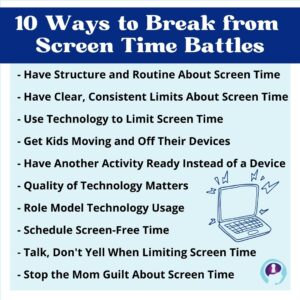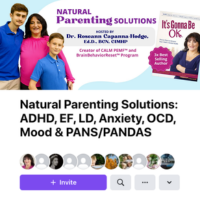A 2019 study looked at the online activity and screen use patterns of almost 4,000 adolescents over a four-year period starting in the seventh grade. They found that increased use of social media, television, and computer increases anxiety in teenagers. I know cue a huge eye roll… like we needed a study to tell us that.
Even though the information may seem obvious to parents, this does spotlight how we choose to monitor our children’s use with electronics. In a world where information is being thrown at us from every conceivable angle with very little human interaction, this study finally confirms what we have known all along, that when teens spend to much time on their devices, they become anxious.
This study suggests that not all active screen time impacts children in the same way and it isn’t always bad. For example, more passive online usage like watching YouTube videos versus interacting on online was linked to higher levels of depression.
A major finding was that on average, as teenager’s use of social media increased in a given year, so too did their reported symptoms of depression that year. While we can speculate that it is from passive engagement versus active engagement, more studies need to be done to get to the root cause of the issue.
Another finding was that computer usage was linked exclusively to anxiety while depression is linked to social media and television usage. This prompts major questions as to what differences in those sources of media are sparking that depression. Bullying or comparative social pressures on social media are contributing factors that need to be further examined.
With anxiety, computer usage could be as simple as students using it to do homework, thus causing anxiety. This is entirely plausible considering that video games were found to not increase anxiety among teenagers. Videogames are based on your ability to interact within the game as well as puzzle/problem solving at the core of games and thus are more active and not as passive.
As we explore new frontiers in teen mental health (especially in relation to our rapidly changing world), it just creates more questions about the content of our daily lives and our interactions with media as a whole. Screen time battles are very real for parents and can be incredibly stressful for child and parent.

Conclusions from this research prompts the question to how can parents limit their teen’s or child’s media usage? Couldn’t I simply put a parental block on everything? You could, but this creates unhealthy habits. If your child isn’t regulating their own content intake, you are and that isn’t going to help them in the long-term.
Not only can you get around every parental block that you can think of, it takes minimal effort to do. Your child could simply download an app that will make them invisible on your wifi, and there are multiple ways to do that. More than that though, in this ever changing world you can’t regulate your child forever.
They can learn to have healthy boundaries and it starts with you role modeling healthy usage. That means no screen time at dinner and when you are talking with your child.
The most effective method is to talk to your child about the negative impacts of overusing social media, television and the computer. They have to understand the impact of screen time on the brain and body. Create agreed upon limits with you. They also need to physically monitor the amount of time they are spending online. This gives them a clear sense of how time consuming it can be.
Now you are probably wondering: “well if I can’t control it how do I create healthy habits and boundaries?” So glad you asked, I couldn’t have said it better myself! There are lots of ways to create healthy boundaries with social media. The best way is to have the physically get out and do something. It could be anything. Maybe your teen wants to start doing yoga? Wants to join a cycling club? Wants to join a team?
Any other activity that is physically stimulating is great, not only for physical health but mentally you are going to have those increase endorphin levels which will naturally combat that anxiety and depression. It isn’t just great for that, but every minute you’re physically doing something is another minute that you aren’t watching tv or on your phone. It’s pretty hard to update your status and participate in a soccer game at the same time! Also, encourage teens to engage in active screen time and not just watch videos.
Even though we are in a society that demands online interaction, we still have the choice to take in as much or as little media as we want, no matter how hard that may seem at times. Help them cultivate friendships, be engaged online, and find healthy physical endeavors.
Citations:
Boers, E., Afzali, M. H., Newton, N., & Conrod, P. (2019). Association of Screen Time and Depression in Adolescence. JAMA pediatrics, 173(9), 853–859. https://doi.org/10.1001/jamapediatrics.2019.1759
Always remember… “Calm Brain, Happy Family™”
Are you looking for SOLUTIONS for your struggling child or teen?
Dr. Roseann and her team are all about solutions, so you are in the right place!
There are 3 ways to work with Dr. Roseann:
You can get her books for parents and professionals, including: It’s Gonna Be OK™: Proven Ways to Improve Your Child’s Mental Health, Teletherapy Toolkit™ and Brain Under Attack: A Resource For Parents and Caregivers of Children With PANS, PANDAS, and Autoimmune Encephalopathy.
If you are a business or organization that needs proactive guidance to support employee mental health or an organization looking for a brand representative, check out Dr. Roseann’s media page and professional speaking page to see how we can work together.
Dr. Roseann is a Children’s Mental Health Expert and Therapist who has been featured in/on hundreds of media outlets including, CBS, NBC, FOX News, PIX11 NYC, The New York Times, The Washington Post,, Business Insider, USA Today, CNET, Marth Stewart, and PARENTS. FORBES called her, “A thought leader in children’s mental health.”

She is the founder and director of The Global Institute of Children’s Mental Health and Dr. Roseann Capanna-Hodge. Dr. Roseann is a Board Certified Neurofeedback (BCN) Practitioner, a Board Member of the Northeast Region Biofeedback Society (NRBS), Certified Integrative Medicine Mental Health Provider (CMHIMP) and an Amen Clinic Certified Brain Health Coach. She is also a member of The International Lyme Disease and Associated Disease Society (ILADS), The American Psychological Association (APA), Anxiety and Depression Association of America (ADAA) National Association of School Psychologists (NASP), International OCD Foundation (IOCDF) International Society for Neurofeedback and Research (ISNR) and The Association of Applied Psychophysiology and Biofeedback (AAPB).
© Roseann-Capanna-Hodge, LLC 2023
Disclaimer: This article is not intended to give health advice and it is recommended to consult with a physician before beginning any new wellness regime. *The effectiveness of diagnosis and treatment vary by patient and condition. Dr. Roseann Capanna-Hodge, LLC does not guarantee certain results.













